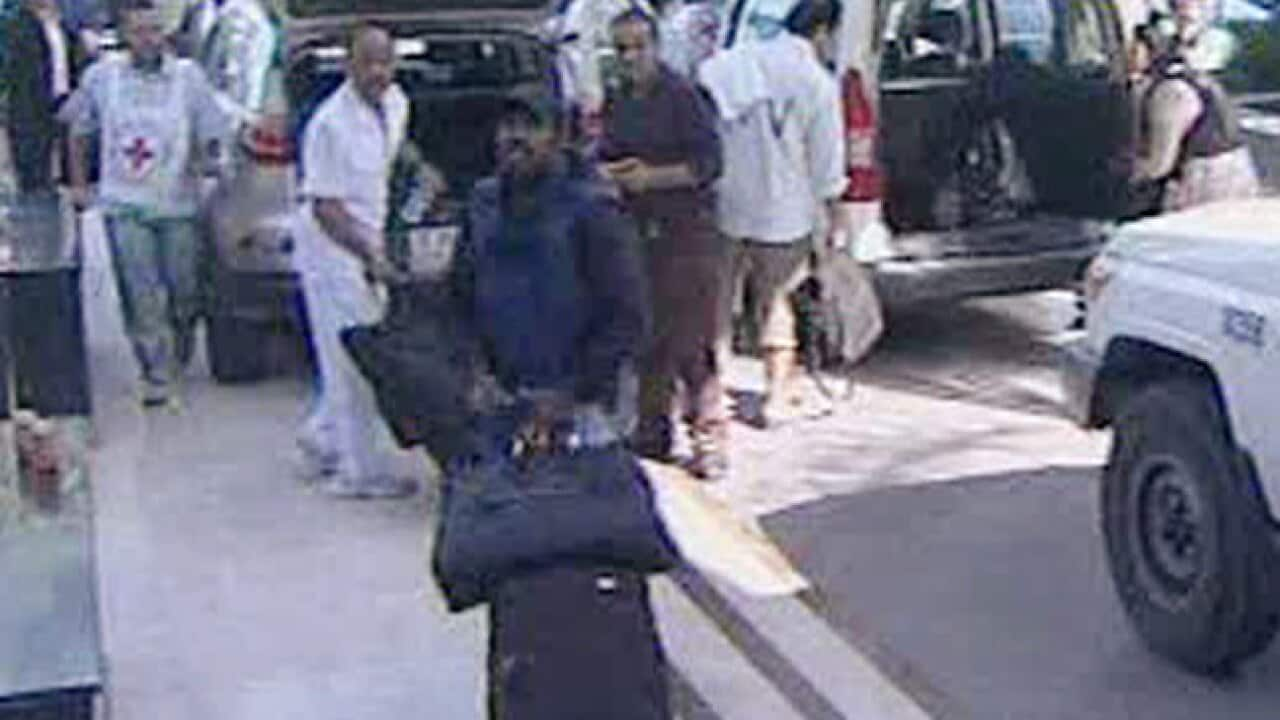Thirty, mostly foreign, journalists held in Tripoli's Rixos Hotel by Gaddafi loyalists have been freed, while rebels continued fighting and offered a $A1.6 million bounty for Gaddafi.
The journalists, who were growing short of food and water after being confined to the hotel since Sunday, left there around 1pm on Wednesday (01:00 Thursday AEST), they reported.
"The crisis is over. The journalists are out," one of them announced on Twitter.
Libyan rebels have put a price of two million dinars ($A1.59 million) on the head of strongman
Muammar Gaddafi, dead or alive, the head of the Transitional National Council says.
"The NTC supports the initiative of businessmen who are offering two million dinars for the capture of Muammar Gaddafi, dead or alive," Mustafa Abdel Jalil said in Tripoli on Wednesday.
Their release comes as rebels continued running battles with Gaddafi loyalists in Tripoli, while the whereabouts of the former storngman was unclear.
The rebels have put a price of two million dinars ($A1.59 million) on the head of strongman
Muammar Gaddafi, dead or alive, the head of the Transitional National Council says.
"The NTC supports the initiative of businessmen who are offering two million dinars for the capture of Muammar Gaddafi, dead or alive," Mustafa Abdel Jalil said in Tripoli on Wednesday.
TENSION HIGH IN HOTEL
The circumstances of the journalists' release were not immediately known, but a reporter from AFP newswire said they had moved to the Corinthia Bab Africa Hotel in a safer part of the city.
Since early on Monday, the journalists had been unable to leave the Rixos, where the regime obliged foreign media to reside.
The vast majority of government soldiers standing guard outside had abandoned their positions by Wednesday, as rebel forces laid claim to vast swathes of Tripoli, including Gaddafi's nearby Bab al-Aziziya compound.
But a handful remained, dressed in civilian clothes and carrying Kalashnikov assault rifles.
Journalists were kept on the first floor, and spent the entire day wearing bullet-proof vests and helmets.
Electricity, temporarily cut, has been restored, but water remained scarce.
Mobile phone signals were poor.
"It's getting pretty miserable here and you can only imagine the sort of tension which the foreigners here, the journalists here, find themselves feeling at the moment," BBC correspondent Matthew Price told BBC Radio on Wednesday.
After their release, Price said: "We drove out of the hotel compound into a completely different city than the one we had seen seven days earlier."
Speaking of the guards, he said "it was firmly their belief that if we went outside of the hotel, the rebels would capture us, kill us and rape the women."
The reporters said they were in the dark about what to expect and whether or not rebel forces would meet armed resistance once they attempted to take the Rixos.
"I got to one point some time on Monday when I thought: they're going to use this hotel as a barracks for the army for one last stand," Price said "If they do that, what's going to happen to us? We found out we had no viable escape route. In the middle of all this violence,
with the battle flaring up around us which we could hear but not see, it created this sense of paranoia."
As a result, they hung banners outside windows plastered with the words TV, Press, or in Arabic: News, do not shoot.
Wednesday morning, some of the journalists attempted to venture a few metres from the hotel before gunfire erupted and armed men ordered them back inside.
In addition to the guards, the reporters also told expressed fears of sniper fire.
"Gunmen were roaming around the corridors," Price said. "We believe there are still snipers on the roof of the hotel and effectively our movements are curtailed."
On Tuesday, the hotel was hit by stray bullets fired when Bab al-Aziziya fell to rebel forces. The two sites are separated by a wooded area.
Inside the hotel, the journalists were largely deprived of water and electricity and food was in short supply.
After rebel forces launched an assault on Tripoli days ago, the Rixos's staff and management abandoned their posts, while regime officials who used the hotel as an office also disappeared.
Share

